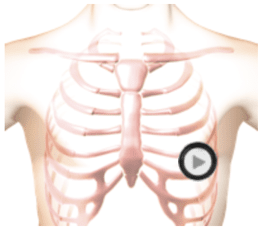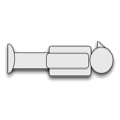Normal First and Second Heart Sounds Lesson #654


The patient was supine during auscultation.
Description
This is a normal first and second heart sound at 60 beats per minute. You are auscultating at the Mitral valve area (Apex). The first heart sound has slightly greater intensity than the secondThis page presents normal first and second heart sounds with a heart rate of 60 bpm. Auscultate these sounds at the mitral valve area (apex) or tricuspid area. Often the first heart sound will be louder than the second heart sound.
The first heart sound is produced by the closing of the mitral and tricuspid valve leaflets. The mitral sound (M1) typically occurs before the tricuspid sound (T1). T1 and S1 splitting can be best heard at the tricuspid location. If M1 and T1 are separately distinguished, this is called an S1 split. S1 splitting is common in children. An S1 split can be associated with EKG-related abnormalities such as right bundle branch block, premature ventricular contractions, or ventricular tachycardia in adults.
The second heart sound is produced when the aortic and pulmonic valve leaflets close. S2 splitting will be presented in the next module.
Phonocardiogram
Anatomy
Normal First and Second Heart Sounds
Authors and Sources
Authors and Reviewers
-
Heart sounds by Dr. Jonathan Keroes, MD and David Lieberman, Developer, Virtual Cardiac Patient.
- Lung sounds by Diane Wrigley, PA
- Respiratory cases: William French
-
David Lieberman, Audio Engineering
-
Heart sounds mentorship by W. Proctor Harvey, MD
- Special thanks for the medical mentorship of Dr. Raymond Murphy
- Reviewed by Dr. Barbara Erickson, PhD, RN, CCRN.
-
Last Update: 11/10/2021
Sources
-
Heart and Lung Sounds Reference Library
Diane S. Wrigley
Publisher: PESI -
Impact Patient Care: Key Physical Assessment Strategies and the Underlying Pathophysiology
Diane S Wrigley & Rosale Lobo - Practical Clinical Skills: Lung Sounds
- PESI Faculty - Diane S Wrigley
-
Case Profiles in Respiratory Care 3rd Ed, 2019
William A.French
Published by Delmar Cengage - Essential Lung Sounds
by William A. French
Published by Cengage Learning, 2011 - Understanding Lung Sounds
Steven Lehrer, MD
- Clinical Heart Disease
W Proctor Harvey, MD
Clinical Heart Disease
Laennec Publishing; 1st edition (January 1, 2009) -
Heart and Lung Sounds Reference Guide
PracticalClinicalSkills.com